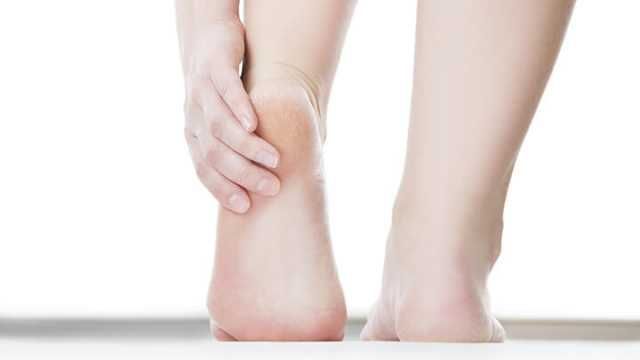
For most of the year, you can pretend everything is fine. You hide your heels in socks, slather moisturizer by the bucket-load onto them, and try not to think about it. But when summer rolls around and you dust off the flip flops, the ruse is up. Those dry, cracked, painful heels you’ve been hiding are finally exposed to the world. And it ain’t pretty!
Not only are dry heels unsightly, they can make your life a whole lot less enjoyable. At best, they may be slightly uncomfortable to walk on. They may catch annoyingly on socks every time you take them on and off. At worst, they can become so parched and cracked that they literally split open and bleed profusely. This can make for a slightly awkward and rapid exit from your friend’s house as you leave vivid red footprints on their nice cream carpet.
Cracked heels are typically associated with dry, hard, thickened skin around the rim of the heel. This nasty piece of work is called a callus and can be anything from yellow to dark brown in color. At the beginning, small cracks form within the callus, but over time these cracks can become deep fissures. If left untreated, these fissures can make walking or even standing a painful process, plus they can develop infections of their own. In worse case scenarios, they can begin to bleed openly.
The ambient humidity level of the environment you live in can certainly play a role in determining your propensity for cracked heels. There’s also plenty of other things which could be causing your problem. These include dermatitis or psoriasis, excessive weight or obesity, excessive standing on hard floors and certain types of footwear.
Yes, these are all valid contributors to cracked heels. But there’s one problem in particular which is most likely to cause you grief on the bottom of your feet. And that, my friends, is problems with your thyroid.
What is the thyroid?

The thyroid gland is a small but vitally important organ located at the base of your neck. This butterfly-shaped organ, situated just below where the Adam’s apple sits on men, plays a wide range of roles in the human body.
For starters, it directly influences many of the body’s key organs, including the heart, brain, liver, kidneys and epidermis (skin). Vital body functions associated with the thyroid gland include:
- Heart rate
- Breathing
- Muscle function and strength
- Central nervous system operation
- Body weight regulation
- Menstrual cycles
- Body temperature regulation
- Cholesterol regulation
Really, that’s just the tip of the iceberg. The role of the thyroid gland is so wide-ranging and intricate that it continues to surprise and amaze medical researchers. This organ is part of the endocrine system. It is made up of glands which produce, store and release hormones into the bloodstream. For this reason, any hormonal problems in your body are often strongly linked to thyroid dysfunction.
Thyroid dysfunction and cracked heels
It may seem a little far-fetched to think that the thyroid gland could be the cause of your foot problems. But when you consider the wide-ranging role of this organ, perhaps it’s not so ridiculous!
Hypothyroidism is a hormonal imbalance in which the body produces insufficient quantities of thyroid hormone. In some cases, the body may produce no thyroid hormones whatsoever, although you’d quickly know if you were suffering from that particular condition!
Hypothyroidism is caused by a range of factors, including autoimmune diseases such as Hashimoto’s, pregnancy, thyroid surgery, radiation therapy to eliminate cancer and certain medications.
Perhaps the biggest cause of hypothyroidism, however, is one which your doctors won’t tell you about. Stress! Chronic stress places undue pressure on the adrenals, which secrete the hormones cortisol and adrenaline in order to regulate that stress. Over time, your adrenals can become worn down due to constant pressure to produce these hormones. One of the results is hypothyroidism, which occurs when the weakened adrenals play havoc with your thyroid gland.
A side effect of hypothyroidism is dry, cracked heels. This occurs when the now under-active thyroid gland under-regulates the sweat glands in your feet, causing them to dry up. As your thyroid worsens, so too do your feet, and no amount of moisturizing or foot treatment can bring them back under control.
The key, therefore, is to determine whether you are suffering from hypothyroidism, and address the problems causing it. If you are on medications, research whether any of their reported side effects contribute to an underactive thyroid. Sugary or gluten-based foods should be removed from your diet for a month. After some time, you’ll see whether they are contributing to thyroid-inhibiting autoimmune disorders. If you’re constantly stressed out from work, money or relationships, try introducing meditation or therapeutic exercise into your life.
Other symptoms of hypothyroidism

One of the most common symptoms of an underactive thyroid is a lack of energy. People with hypothyroidism often find it particularly difficult to get up and going in the morning. These same people tend to be prone to nodding off when they sit down. They are often asleep before they even hit the pillow at night. This is because the thyroid gland regulates and increases energy production. When it is down in the dumps, so are your energy levels.
A run-on from this problem of low energy is an impaired metabolism. Hypothyroidism slows the metabolic processes in the body, which can lead to cold sensitivity. An impaired metabolism also means your body is less able to convert the nutrients from the foods you eat into energy. Those calories go straight to the hips instead of to your muscles.
Another adverse effect of hypothyroidism is impaired brain function. A lack of thyroid hormone production can make it difficult to focus, which in turn can lead to depression. Depression mixed with already low energy levels makes the average hypothyroidism sufferer feel every ache and pain, and struggle to find the motivation to start each day.
But the impact on brain function as a result of hypothyroidism doesn’t stop there. This study, which examined the breadth of Alzheimer’s disease and dementia-related literature, found that there may be a link between Alzheimer’s and hypothyroidism. Alzheimer’s is the most common form of dementia, initially targeting memory then progressively destroying the mind. Even in those not suffering from this disease, hypothyroidism can increase atrophy of the brain, affecting memory and a range of other functions.
You’re probably already quaking in your boots at the thought of hypothyroidism. However, this is just the beginning. Other common symptoms of an underactive thyroid include:
- Frequent constipation
- Dry skin (not just on your heels, but everywhere!)
- Hair loss
- Menstrual cycle changes
- Infertility
- Cholesterol issues
The take-away here is that if you’re suffering from cracked heels, look a little deeper. It could just be a simple case of dry skin. But perhaps it’s merely the tip of the iceberg… a hypothyroidism iceberg.
— Liivi Hess
In your quest to resolve your cracked heel problem, it’s clear that you need to get your thyroid under control. If this is the case, you might want to check out these foods to give you a natural helping hand.

